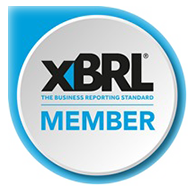It is a fact that regulators like Central Banks and Stock Exchange supervisors are rapidly implementing XBRL all over the world. In the surface, this is just changing the format of a document and it would not be so important if only a small number of regulators were doing the same. The importance of this movement comes once companies realize that there is a standard for exchanging reports and that is is the same standard all over the world. This is, in fact, reducing the cost of being global.
 Super User
Super User
XBRL for Regulators
XBRL is now the standard for transmission of financial information between the most important regulators in the financial market and banking supervision institutions. XBRL simplifies the processes of collecting information and processing it due to the reason every little piece of data is tagged for the data transmission and each concept used is documented in the taxonomy. The data can be validated on the receivers side and on the senders side. On the other side, XBRL is a royalty free standard that allows regulators to be isolated from the information systems on the data preparers side.
Versioning Reports Editor
This tool allows you to compare two DTSs (Two XBRL Taxonomies) and generate a versioning report. That report could be used by mapping tools to migrate the mappings to a new taxonomy version and reduce the amount of work needed to implement the changes. Versioning will reduce the time between a change in the reporting … Read more
The XBRL Database
Reporting Standard has develop a relational database model for storing XBRL information such as XBRL Reports, XBRL Taxonomies and linkbases. The database allows you to store in the database two things simultaneously: Firstly, the database will store an exact copy of the files transmitted, this allows Reporting Standard tools to access to the files as … Read more
XBRL In Out Data Mapper
Q: What is the XBRL Mapper?
A: The XBRL Mapper consist of a set of two software components that will allow you to transform data in two directions: The Generator transforms from any format to XBRL and the Interpreter transforms from XBRL to any other format.
Q: What are the most common uses of the XBRL Mapper?
A: The XBRL Mapper can be used: – As an XBRL Report Generator: The Mapper can access data in the internal repositories of information and generate an XBRL report. – As an interpreter of XBRL Reports: The Mapper will read the content of an XBRL report and will load the data in the data repositories.
XBRL Consulting Services
Consulting services provided by Reporting Estándar Integration of XBRL functionality Automation of the XBRL report generation COREP/FINREP/ Development of XBRL 2.1 taxonomies Development of technical architectures to take advantages of XBRL XBRL Training Support and maintenance of our products
Additional validation modules
Dimensions validation (XDT) This module provides the functionality to the Reporting Estándar S.L. XBRL Processor to recognize the error conditions stated in the XBRL Dimensions specification 1.0. That specification is now an XBRL Recommendation complementary to the XBRL 2.1 specification. This processor is certified by XBRL Internacional (XQuery) Formula Processor Este módulo permite crear reglas … Read more
XBRL 2.1 validation engine
Reporting Estándar S.L. has developed an XBRL 2.1 Validation Engine that complies 100% with the XBRL 2.1 specification requirements.
The validation engine can be installed in the Accelerated Validation mode. In this case, the validation engine can be installed as a software component integrated to an existing infrastructure.
XBRL Versioning Specification
Currenlty this is a document under development by the XBRL Versioning Working Group. The Versioning Specification would allow documenting the changes between two taxonomy versions and communicate the changes in a standardized way. The benefits of preparing standardized versioning reports are that the software can automatically use the versioning reports in order to update the … Read more
Formula specification based on XQuery 1.0
Currently this is a document submitted to the Formula Working Group. Reporting Estándar has implemented a formula processor based on XQuery. This formula processor is implemented as an add-on module that can be plugged-into the XBRL API. This module allows the creation of validation rules using the XQuery language developed by the W3C consortium. Additionally, … Read more




